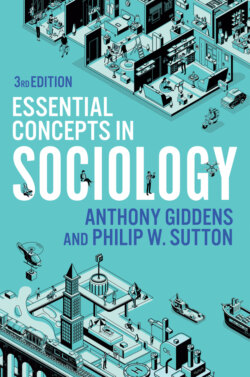Читать книгу Essential Concepts in Sociology - Anthony Giddens - Страница 13
Origins of the Concept
ОглавлениеThe idea of a worldwide human society can be traced back to discussions of the prospects for ‘humanity’ as a whole during the eighteenth-century Enlightenment period. Globalization can also be distilled from the nineteenth-century ideas of Marx on the expansive tendencies of capitalism and Durkheim on the geographical spread of the division of labour. However, the first dictionary entry for ‘globalization’ in the modern sense was in 1961, and only in the early 1980s was the term in regular use in economics (Kilminster 1998: 93).
A significant forerunner of the globalization thesis in sociology is Immanuel Wallerstein’s ‘World Systems Theory’ (1974, 1980, 1989). Wallerstein argued that the capitalist economic system operates at the transnational level, constituting a world system with a core of relatively rich countries, a periphery of the poorest societies, and a semi-periphery squeezed in between. However, contemporary debates stem from a perceived acceleration of globalization from the 1970s caused by the growth and power of multinational corporations, concerns about the decline of the nation state, the rise of supranational trading blocs and regional economic and political entities (such as the European Union), cheaper travel leading to more widespread foreign tourism and migration, and the advent of the internet enabling rapid global communication. By the 1990s, the concept of globalization had entered the sociological mainstream, impacting on all of the discipline’s specialist fields.
